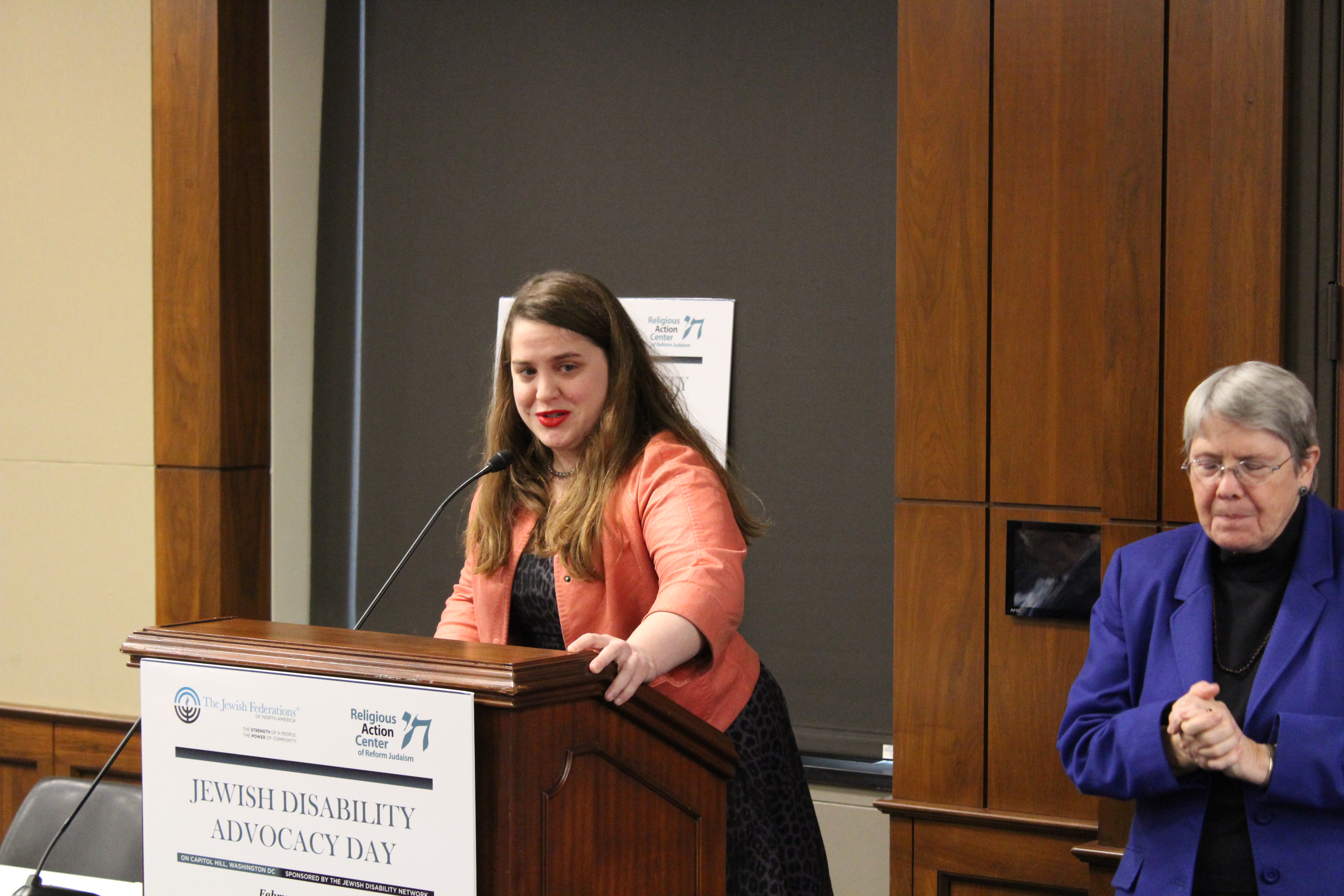
Maria Town, the Associate Director of the White House's Office of Public Engagement addresses JDAD 2016
When Jewish advocates came to Washington for Jewish Disability Advocacy Day 2016 (JDAD) the day got personal quickly. The Center for Disease Control and Prevention reports that 53 million Americas live with a disability, so the civil rights and inclusion of people with disabilities affects not only every JDAD participant in some way, but nearly every person living in America. When the 150 Jewish advocates from across the country and the religious spectrum joined together to speak out, they spoke on behalf of themselves, their family members, and their friends who merely expect to be able to participate in all aspects of society.
Personal Connection Drives Action
At JDAD 2016, hosted by the Religious Action Center and Jewish Federations of North America, participants spent the morning discussing the future of disability policy and advocacy. In the afternoon they headed to congressional offices to advocate for important legislation affecting people living with disabilities and their caretakers. JDAD welcomed Maria Town, the associate director for the White House’s office of public engagement, who spoke about living with a disability and efforts the White House is taking to promote disability rights throughout the country. The White House will be hosting a conversation on Jewish Disability Awareness and Inclusion during the month of February.
Members of Congress from both parties addressed the group, including Rep. Jim Langevin (RI), Rep. Gregg Harper (Miss), Rep. Cathy McMorris-Rodgers (WA), Rep. Mike Fitzpatrick (PA), among others. Most of these representatives, spoke about their direct connection to disability, either living with a disability themselves or caring for a child who has a disability. Representative Harper, co-chair of the bipartisan congressional disability caucus, talked about his efforts to create an internship program on Capitol Hill for people with intellectual disabilities. He said that often the low expectations of parents is what holds back children, and that it is up to us to set the bar high. Uniting the remarks of these members was their personal connection to disability. The fight for the civil rights of people with disabilities, remains bipartisan because disability itself is not partisan. While there are numerous pieces of legislation that must be passed to accomplish the goal of full inclusion, the more exposure we have to disability, the more compassion we hold and the better equip we are to speak out.
Expanding Employment and Caring for Caregivers
This year, JDAD advocates promoted three bills that expanded opportunities for integrated employment above the federal minimum wage and provided resources for unpaid family caregivers. Jennifer Lazlo-Mizrahi of RespectAbility USA, Gene Cohen of the International Association of Jewish Vocational Services, and Jennifer Sheehy of the Office of Disability Employment Policy in the Department of Labor to discuss meaningful policy reform that should be taken to increase. Representatives from AARP and the Autism Self Advocacy Network (ASAN) provided context about the legislation helping advocates make the best case for the bills to congressional staffers.
The day focused on promoting employment opportunities and caretaker support as ways to expand the rights of people with disabilities. According to the Department of Labor, at least 228,600 people work in “sheltered” employment in which they can make as little as one dollar an hour, an amount well below the federal minimum wage. In these work environments people with disabilities have very little interaction with others and there is little opportunity for advancement. The Transition to Independence Act (S. 1604) would provide money to up to ten states that help move people from sheltered workshops, to integrated employment where they are paid at least the federal minimum wage.
As for caregivers, 43.5 million Adults have provided unpaid care to a family member during the last year. While being a caregiver can be an incredibly fulfilling responsibility, it also can impede on a person’s time to care for their own physical and mental health. The Lifespan Respite Care Reauthorization Act (H.R. 3913) and the RAISE Family Caregivers Act (H.R. 3099) provide funding for state run respite care programs and require the department of health and human services to develop a national caregivers strategy respectively. This legislation provides the resources caregivers need to be fully present for their loved ones.
JDAD advocates were influential on Capitol Hill because they incorporated their personal experiences, living with disabilities or serving as caretakers, into their legislative asks. These stories resonated with congressional staffers because they put a human face on the issues and illuminate the statistics. Together advocates visited over thirty congressional offices telling their stories and calling for change. JDAD is important because it gives the Jewish community the opportunity to connect with legislators and their staffs, but it is only the first step in making real reform. We will need to continue to share our stories, both during this Jewish Disability Awareness and Inclusion month of February, and into the future. We have the power to use our stories to connect with others, and to one day achieve full inclusiveness
Visit the RAC’s disability rights page to learn how you can get involved.
Related Posts

Remarks from Rabbi Eliana Fischel at Jewish Gathering for Abortion Access

Teens from North Carolina Speak About Environmental Justice


